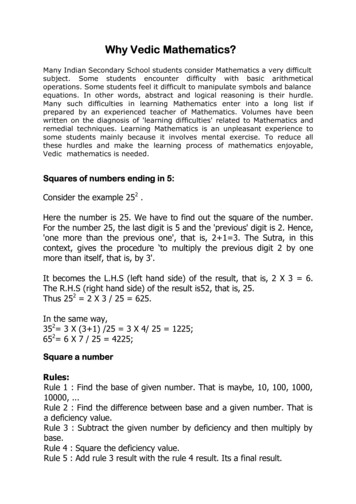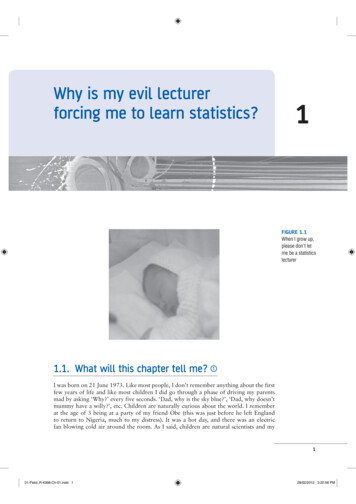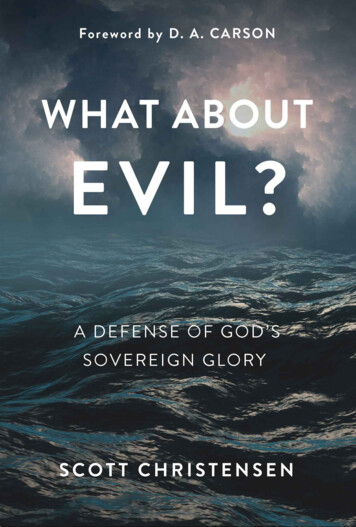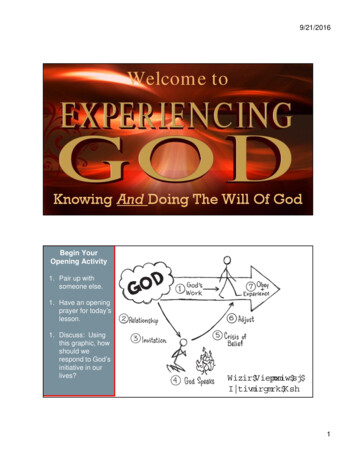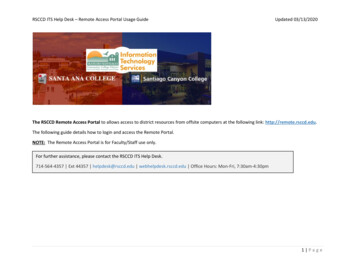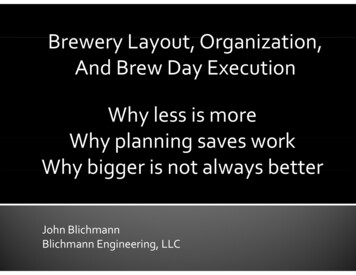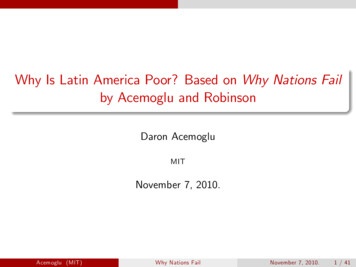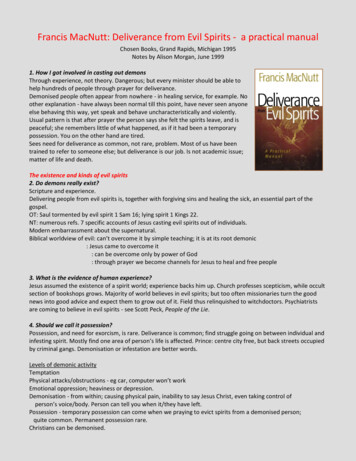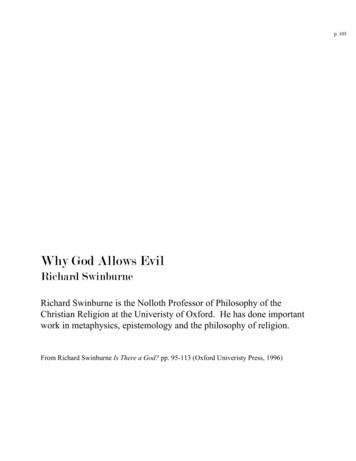
Transcription
p. 105Why God Allows EvilRichard SwinburneRichard Swinburne is the Nolloth Professor of Philosophy of theChristian Religion at the Univeristy of Oxford. He has done importantwork in metaphysics, epistemology and the philosophy of religion.From Richard Swinburne Is There a God? pp. 95-113 (Oxford Univeristy Press, 1996)
106 PART 1 Reason and Reli gious BeliefThis world is a clearly providential world in thissense-that we humans can have a great influenceon our own destiny, and on the destiny of ourworld and its other inhabitants; and it is verygood for us that it is like that. And yet animalsand humans suffer (through natural processes ofdisease and accident), and they cause each otherto suffer (we hurt and n1aim each other andcause each other to starve). T he world, that is,contains much evil. An omnipotent God couldhave prevented this evil, and surely a perfectlygood and o.m nipotent God would have done so.So why is there this evil? Is not its existence strongevidence against the existence of God? It would beunless we can construct what is known as a theodicy, an explanation of why God would allo\vsuch evil to occur. I believe that that can bedone, and I shall outline a theodicy in this chapter.I emphasize that in . \Vriting that God would dothis or that, I am not taking for granted the existence of God, but merely claiming that, if thereis a God, it is to be expected that he vvould do certain things, including allowing the occurrence ofcertain evils; and so, I am claiming, their occurrence is not evidence against his existence.It is inevitable that any attempt by myself oranyone else to construct a theodicy will soundcallous, indeed totally insensitive to human suffering. Many theists, as well as atheists, have feltthat any attempt to construct a tl1eodicy evincesan immoral approach to suffering. I can onlyask the reader to believe that I am not totallyinsensitive to hu1nan suffering, and that I don1ind about the agony of poisoning, childabuse, bereavement, solitary imprisonment, andmarital infidelity as much as anyone else. True, I\Vould not in most cases recommend that a pastorgive this chapter to vi.ctin1s of sudden distress attheir vvorst moment, to read for consolation.But this is not because its arguments areunsound; it is simply that most people in deepdistress need comfort, not argument. Yet thereis a problem about vvhy God allows evil, and, ifthe theist does not have (in a cool moment) a satisfactory answer to it, then his belief in God is lessthan rational, and there is no reason why theatheist should share it. To appreciate the argument of this chapter, each of us needs to standback a bit fro1n the particular situation of his orher own life and that of close relatives and friends(which can so easily seem the only importantthing in the world ), and ask very generally whatgood things would a generous and everlastingGod give to human beings in the course of ashort earthly life. O f course thrills of pleasureand periods of contentment are good things,and-other things being equal-God would certainly seek to provide plenty of those. But a generous God will seek to give deeper good thingsthan these . He \vill seek to give us great responsibility for ourselves, each other, and the world,and thus a share in his own creative activity ofdetermining what sort of world it is to be. Andhe will seek to make our lives valuable, of greatuse to ourselves and each other. The problem isthat God cannot give us these goods in full measure without allo .ring much evil on the way.The problem of evil is not that of the absenceof various good states. We noted in Chapter 1*that, ho\vever much good God creates, he couldcreate more; and he does not in general have anyobligation to create. That is vvhy death is not initself an evil; death is just the end of a goodstate, life (and in any case one of which Godmay choose to give us more-by giving us a lifeafter death). Death may be an evil if it comes prematurely, or causes great grief to others; but initself it is not an evil. But there are plenty ofevils, positive bad states, which God could if hechose remove. I divide these into moral evils andnatural evils. I understand by "natural evil" allevil which is not deliberately produced by humanbeings and which is not allowed by human beingsto occur as a result of their negligence. Natural evilincludes both physical suffering and mental suffering, of animals as well as humans; all the trail ofsuffering which disease, natural disasters, and accidents unpredictable by humans bring in theirtrain. "Moral evil" I understand as including allevil caused deliberately by humans doing whatthey ought not to do (or allowed to occur byhumans negligently failing to do what theyought to do ) and also the evil constituted bysuch deliberate actions or negligent failure. Itincludes the sensory pain of the blow inflicted by*(01nitted here-Ed.]
RICHARD SWINBURNE Why God Allo"vs Evilthe bad parent on his child, the mental pain of theparent depriving the child of love, the starvationallowed to occur in Africa because of negligenceby members of foreign governments who couldhave prevented it, and also the evil of the parentor politician deliberately bringing about the painor not trying to prevent the starvation.MORAL EVILThe central core of any theodicy must, I believe,be the "free-vvill defence," vvhich deals-to startwith-with moral evil, but can be extended todeal with 1nuch natural evil as well. The free-willdefence claims that it is a great good that humanshave a certain sort of free will which I shall call freeand responsible choice, but that, if they do, thennecessarily there \v:ill be the natural possibility ofmoral evil. (By the "natural possibility" I meanthat it will not be determined in advance whetheror not the evil will occur.) A God who giveshumans such free will necessarily brings aboutthe possibility, and puts outside his own controlwhether or not that evil occurs. It is not logicallypossible-that is, it would be self-contradictoryto suppose-that God could give us such freewill and yet ensure that we always use it in theright way.Free and responsible choice is not just free \villin the narrov.r sense of being able to choosebetween alternative actions, without our choicebeing causally necessitated by some prior cause.I have urged, for the reasons given in the last·chapter,* that humans do have such free will. Buthumans could have that kind of free will merelyin virtue of being able to choose freely benveennvo equally good and unimportant alternatives.Free and responsible choice is rather free will (ofthe kind discussed) to make significant choicesbetween good and evil, which make a big difference to the agent, to others, and to the world.Given that we have free will, we certainly havefree and responsible choice. Let us remind ourselves of the difference that humans can make tothemselves, others, and the world. Humans haveopportunities to give themselves and others*[0111itted here-Ed.]107pleasurable sensations, and to pursue worthwhileactivities-to play tennis or the piano, to acquireknowledge of history and science and philosophy,and to help others to do so, and thereby to builddeep personal relations founded upon such sensations and activities. And hu1nans arc so 1nade thatthey can form their characters. Aristotle fa1nouslyremarked: "we become just by doing just acts,pn1dent by doing prudent acts, brave by doingbrave acts." That is, by doing a just act when itis difficult-when it goes against our natural inclinations (which is what I understand by desires)we make it easier to do a just act next ti1ne. Wecan gradually change our desires, so that-forexample-doing just acts becomes natural.Thereby we can free ourselves from the powerof the less good desires to which we are subject.And, by choosing to acquire knowledge and touse it to build machines of vario us sorts, humanscan extend the range of the differences they can1nake to the world-they can build universitiesto last for centuries, or save energy for the nextgeneration; and by cooperative effort over manydecades they can eliminate poverty. The possibilities for free and responsible choice are enormous.It is good that the free choices of humansshould include genuine responsibility for otherhun1ans, and that involves the opportunity tobenefit or harm them. God has the power to benefit or to harm hun1ans. If other agents are to begiven a share in his creative work, it is good thattl1ey have that power too (although perhaps to alesser degree). A world in which agents can benefit each other but not do each other harn1 is onewhere they have only very limited responsibilityfor each other. If my responsibility for you is limited to whether or not to give you a camcorder,but I cannot cause you p n, st1u1t your growth,or limit your education, then I do not have agreat deal of responsibility for you. A God vvhogave agents only such li1nited responsibilities fortheir fellows \Vould not hav given much. Godwould have reserved for himself the all-in1portantchoice of the kind of world it was to be, while simply allowing humans the minor choice of filling inthe details. He would be like a father asking hiselder son to look after the younger son, and adding that he would be watching the elder son'severy move and would intervene the moment
108 PART 1 Reason and Religious Beliefthe elder son did a thing wrong. The elder sonmight justly retort that, while he would behappy to share his father's work, he could reallydo so only if he were left to make his own judgements as to what to do within a significant rangeof the options available to the father. A goodGod, like a good father, will delegate responsibility. In order to allow creatures a share in creation,he will allovv them the choice of hurting andmaiming, of frustrating the divine plan. Ourworld is one where creatures have just such deepresponsibility for each other. I can not only benefit my children, but harm them. One way in whichI can harm them is that I can inflict physical painon them. But there are much more damagingthings which I can do to them. Above all I canstop them growing into creatures with significantknowledge, power, and freedom; I can determinewhether tl1ey come to have the kind of free andresponsible choice which I have. The possibilityof humans bringing about significant evil is a logical consequence of their having this free andresponsible choice. Not even God could give usthis choice without the possibility of resulting evil.Now . an action would not be intentionalunless it was done for a reason- that is, seen as insome way a good thing (either in itself or becauseof its consequences). And, if reasons alone influence actions, that regarded by the subject as mostin1portant will determine what is done; an agentunder the influence of reason alone will inevitablydo the action which he regards as overall thebest. If an agent does not do the action which heregards as overall the best, he must have allowedfactors other than reason to exert an influence onhin1. In other words, he must have allowed desiresfor what he regards as good only in a certainrespect, but not overall, to influence his conduct.So, in order to have a choice between good andevil, agents need already a certain depravity, inthe sense of a system of desires for what they correctly believe to be evil. I need to want to overeat,get more than my fair share of money or power,indulge my sexual appetites even by deceiving myspouse or.partner, want to see you hurt, if I amto have choice between good and evil. This depravity is itself an evil which is a necessary condition of agreater good. It makes possible a choice made seriously and deliberately, because made in the face ofgenuine alternative. I stress that, according to thefree-will defence, it is the natural possibility ofmoral evil which is the necessary condition of thegreat good, not the actual evil itself. Whether tl1atoccurs is (through God's choice) outside God'scontrol and up to us.Note further and crucially that, if I suffer inconsequence of your freely chosen bad action,that is not by any means pure loss for me. In a certain respect it is a good for me. My suffering wouldbe pure loss for me if the only good thing in life wassensory pleasure, and the only bad thing sensorypain; and it is because the modern world tends tothink in those terms that the problem of evilseems so acute. If these v,rere the only good andbad things, the occurrence of suffering wouldindeed be a conclusive objection to the existenceof God. But we have already noted the greatgood of freely choosing and influencing our future,that of our fellows, and that of the world. And nownote another great good-the good of our life serving a purpose, of being of use to ourselves andothers. Recall the words of Christ, "it is moreblessed to give than to receive" (as quoted bySt Paul (Acts 20:35)) . We tend to think, whenthe beggar appears on our doorstep and we feelobliged to give and do give, that that was luckyfor him but not for us who happened to be athome. That is not what Christ's words say. Theysay that we are the lucky ones, not just becausewe have a lot, out of which we can give a little,but because we are privileged to contribute to tl1ebeggar's happiness- and that privilege is worth alot more than money. And, just as it is a greatgood freely to choose to do good, so it is also agood to be used by someone else for a worthy purpose (so long, that is, that he or she has the right,the authority, to use us in this way). Being allowedto suffer to make possible a great good is a privilege, even if the privilege is forced upon you.Those who are allowed to die for tl1eir countryand thereby save their country from foreign oppression are privileged. Cultures less obsessed than ourown by the evil of purely physical pain have alwaysrecognized that. And they have recognized that it isstill a blessing, even if the one who died had beenconscripted to fight.And even twentieth-century man can begin tosee that-sometimes-vvhen he seeks to help
RICHARD SWINBURNE Why God Allows Evilprisoners, not by giving them more comfortablequarters, but by letting them help the handicapped; or when he pities rather than envies the"poor little rich girl" who has everything anddoes nothing for anyone else. And one phenomenon prevalent in end-of-century Britain draws thisespecially to our attention- the evil of unemployment. Because of our system of Social Security, theunemployed on the 'vhole have enough money tolive without too nluch discomfort; certainly theyare a Jot better off than are many employed inAfrica or Asia or Victorian Britain. What is evilabout une1nployment is not so much any resultingpoverty but the uselessness of the unemployed.They often report feeling unvalued by society, ofno use, "on the scrap heap". They rightly thinkit would be a good for them to contribute; butthey cannot. Many of them. would welcome a system where they were obliged to do useful work inpreference to one 'vhere society has no use forthem.It follows from that fact that being of use is abenefit for him \Vho is of use, and that those v.rhosuffer at the hands of others, and thereby makepossible the good of those others who have freeand responsible choice, are themselves benefitedin this respect. I am fortunate if the natural possibility of my suffering if you choose to hurt me isthe vehicle which makes your choice really matter.My vulnerability, my openness to suffering (whichnecessarily involves nly actually suffering if youmake the wrong choice), means that you are notjust like a pilot in a simulator, where it does notinatter if inistakes are made. That our choices n1atter tremendously, that 've can make great differences to things for good or ill, is one of the greatestgifts a creator can give us. And if my suffering isthe means by \vhich he can give you that choice,I too am in this respect fortunate. Though ofcourse suffering is in itself a bad thing, my goodfortune is that the suffering is not random, pointless suffering. It is suffering which is a consequenceof my vulnerability which inakes 1ne of such use.Someone may object that the only good thingis not being of use (dying for one's country orbeing vulnerable to suffering at your hands), butbelieving that one is of use- believing that one isdying for one's country and that this is of use;the "feel-good" experience. But that cannot be109correct. Having comforting beliefs is only a goodthing if they are true beliefs. It is not a goodthing to believe that things are going well whenthey are not, or that your life is of use when it isnot. Getting pleasure out of a comforting falsehoodis a cheat. But ifI get pleasure out of a true belief, itmust be that I regard the state of things vvhich Ibelieve to hold to be a good thing. If I get pleasureout of the true belief that my daughter is doing wellat school, it must be that I regard it as a good thingthat my daughter does well at school (whether ornot I believe that she is doing well). If I did notthink the latter, I would not get any pleasure outof believing that she is doing well. Likewise, thebelief that I am vulnerable to suffering at yourhands, and that that is a good thing, can only bea good thing if being vulnerable to suffering atyour hands is itself a good thing (independentlyof whether I believe it or not). Certainly, whenmy life is of use and that is a good for 1ne, it iseven better if I believe it and get co1nfort therefrom; but it can only be even 'better if it is alreadya good for me whether I believe it or not.But though suffering may in these ways servegood purposes, does God have the right to allo"'me to suffer for your benefit, without asking inypermission? For surely, an objector will say, noone has the right to allow one person A to sufferfor the benefit of another one B without A's consent. We judge that doctors who use patients asinvoluntary objects of experimentation in medicalexperiments which they hope will produce resultswhich can be used to benefit others are doingsomething wrong. After all, if my argumentsabout the uti.lity of suffering are sound, ought \Venot all to be causing suffering to others in orderthat those otl1ers may have the opportunity toreact in the right way?There are, however, crucial differencesbetween God and the doctors. The first is thatGod as the author of our being has certain rights,a certain authority over us, vvhich we do not haveover our fellow humans. He is tlle cause of ourexistence at each moment of otu- existence and sustains the laws of nature \vhich give us everything've are and have. To allow someone to suffer forhis own good or that of others, one has to standin some kind of parental relationship towardshim. I do not have the right to let some stranger
110 PART 1 Reason and Religious Beliefsuffer for the sake of some good, when I could easily prevent this, but I do have some right of thiskind in respect of iny own children. I n1ay let theyounger son suffer somewhat for his own good orthat of his brother. I have this right because insmall part I am responsible for the younger son'sexistence, his beginning and continuance. If Ihave begotten him, nourished, and educatedhim, I have some limited rights over him in return;to a very limited extent I can use him for some worthy purpose. If this is correct, then a God who is somuch more the author of our being than are ourparents has so much more right in this respect.Doctors do have over us even the rights of parents.But secondly and all-importantly, the doctorscould have asked the patients for permission; andthe patients, being free agents of some powerand knowledge, could have made an informedchoice of whether or not to allow themselves tobe used. By contrast, God's choice is not abouthow to use already existing agents, but aboutthe sort of agents to make and the sort of worldinto which to put them. In God's situationthere are no agents to be asked. I am arguingthat it is good that one agent A should havedeep responsibility for another B (who in turncould have deep responsibility for another C). Itis not logically possible for God to have asked Bif he wanted things thus, for, if A is to be responsible for B's growth in freedom, knowledge, andpo\ver, there "''ill not be a B with enough freedomand knowledge to make any choice, before Godhas to choose vvhether or not to give A responsibility for him. One cannot ask a baby into vvhichsort of world he or she wishes to be born. Thecreator has to make the choice independently ofhis creatures. He will seek on balance to benefitthem-all of them. And, in giving them tlle giftof life-whatever suffering goes with it- that is asubstantial benefit. But when one suffers at thehands of another, often perhaps it is not enoughof a benefit to outweigh the suffering. Here isthe point to recall that it is an additional benefitto the sufferer that his suffering is the meanswhereby the one who hurt him had the opportunity to make a significant choice between goodand evil which otherwise he would not have had.Although for these reasons, as I have beenurging, God has the right to allow humans tocause each other to suffer, there must be a limitto the amount of suffering 'vhich he has theright to allow a human being to suffer for thesake of a great good. A parent inay allow anelder child to have the power to do some harmto a younger child for the sake of the responsibilitygiven to the elder child; but there are limits. Andthere are limits even to the moral right of God,our creator and sustainer, to use free sentientbeings as pawns in a greater game. Yet, if these limits were too narrow, God would be unable to givehtunans 1nuch real responsibility; he would be ableto allow them only to play a toy gaine. Still, limitsthere must be to God's rights to allow humans tohurt each other; and limits there are in the worldto the extent to which they can hurt each other,provided above all by the short finite life enjoyedby humans and other creatures-one human canhurt another for no more than eighty years orso. And there are a number of other safety-devicesin-built into our physiology and psychology, limiting the amount of pain we can suffer. But the primary safety limit is that provided by the shortnessof our finite life. Unending unchosen sufferingwould indeed to my mind provide a very strongargument against the existence of God. But thatis not the human situation.So then God, vvithout asking humans, has tochoose for them benveen the kinds of world inwhich they can live-basically either a world inwhich there is very little opportunity for humansto benefit or hartn each other, or a world inwhich there is considerable opportunity. Hovvshall he choose? There are clearly reasons forboth choices. But it seems to me (just, on balance)that his choosing to create the world in which wehave considerable opportunity to benefit or harmeach other is to bring about a good at least asgreat as the evil which he thereby allO\.\'S tooccur. Of course the suffering he allows is a badthing; and, other things being equal, to beavoided. But having the natural possibility of causing suffering mal es possible a greater good. God,in creating humans who (of logical necessity) cai1not choose for themselves the kind of world intowhich they are to come, plausibly exhibits hisgoodness in making for them the heroic choicethat they come into a risky world where theymay have to suffer for the good of others.
RICHARD SWINBURNE Why God Allows EvilNATURAL EVILNatural evil is not to be accounted for along thesame lines as moral evil. Its main role rather, Isuggest, is to make it possible for humans tohave the kind of choice which the free -willdefence extols, and to make available to humansspecially worthwhile kinds of choice.There are two ways in which natural eviloperates to give humans those choices. First,the operation of natural laws producing evilsgives humans knowledge (if they choose to seekit) of how to bring about such evils themselves.Observing you catch some disease by the operation of natural processes gives me the powereither to use those processes to give that diseaseto other people, or through negligence to allowothers to catch it, or to take measures to preventothers from catching the disease . Study of themechanisms of nature producing various evils(and goods) opens up for humans a wide rangeof choice. This is the way in which in fact welearn how to bring about (good and) evil. Butcould not God give us the requisite knowledge(of how to bring about good or evil) which weneed in order to have free and responsible choiceby a less costly means? Could he not just whisperin our ears from time to time what are the different consequences of different actions of ours?Yes. But anyone who believed that an action ofhis would have some effect because he believedthat God had told him so would see all his actionsas done under the all-watchful eye of God.He would not merely believe strongly that therewas a God, but would know it with real certainty.That knowledge would greatly inhibit his freedom of choice, would make it very difficultfor him to choose to do evil. This is because \veall have a n atural inclination to wish to bethought well of by everyone, and above allby an all-good God; that we have such an inclination is a very good feature of humans, \vithoutwhich we would be less than human. Also, if wewere directly informed of the consequences ofour actions, we would be deprived of the choicewhether to seek to discover what the consequences were through experiment and hardcooperative work. Knowledge would be availableon tap. Natural processes alone give humans111knowledge of the effects of their actions withoutinhibiting their freedom, and if evil is to be a possibility for them they must know how to allow itto occur.The other way in which n atural evil operatesto give humans their freedom is that it makes possible certain kinds of action towards it betweenwhich agents can choose. It increases the rangeof significant choice. A particular natural evil,such as physical pain, gives to the sufferer achoice- whether to endure it with patience, orto bemoan his lot. His friend can choose whetherto sho\v compassion towards the sufferer, or to becallous. The pain 1nakes possible these choices,which would not otherwise exist. There is noguarantee that our actions in response to thepain will be good ones , but the pain gives usthe opportunity to perform good actions. Thegood or bad actions which we perform in theface of natural evil themselves provide opportunities for further choice-of good or evil stancestowards the former actions. If I am patient withmy suffering, you can choose whether to encourage or laugh at my patience; if I bemoan my lot,you can teach me by word any example what agood thing patience is. If you are sympathetic, Ihave then the opportunity to show gratitude forthe sympathy; or to be so self-involved that Iignore it. H you are callous, I can choose whetherto ignore this or to resent it for life. And so on. Ido not think that there can be much doubt thatnatural evil, such as physical pain, makes availablethese sorts of choice. The actions 'vhich naturalevil makes possible are ones which allow us toperform at our best and interact with our fellowsat the deepest level.It may, hovvever, be suggested that adequateopportunity for these great good actions wouldbe provided by the occurrence of moral evil without any need for suffering to be caused by naturalprocesses. You can show courage 'vhen threatened by a gunman, as well as when threatenedby cancer; and show sympathy to those likely tobe killed by gunmen as well as to those likely todie of cancer. But just imagine all the sufferingof mind and body caused by disease, earthquake,and accident unpreventable by humans removedat a stroke from our society. No sickn ess, nobereavement in consequence of the untimely
112 PART 1 Reason and Religious Beliefdeath of the young. Many of us would then havesuch an easy life that we simply would not havemuch opportunity to show courage or, indeed,manifest much in the way of great goodness atall. We need those insidious processes of decayand dissolution which money and strength cannot ward off for long to give us the opportunities,so easy otherwise to avoid, to become heroes.God has the right to allow natural evils tooccur (for the san1e reason as he has the rightto allow moral evils to occur)-up to a limit. Itwould, of course, be crazy for God to multiplyevils inore and more in order to give endlessopportunity for heroism, but to have some significant opportunity for real heroism and conse quent character formation is a benefit for theperson to whom it is given. Natural evils give tous the knowledge to make a range of choicesbetween good and evil, and the opportunity toperform actions of especially valuable kinds.There is, however, no reason to suppose thatanimals have free \.vill. So what about their suffering? Animals had been suffering for a long timebefore humans appeared on this planet-justhow long depends on which animals are conscious beings. The first thing to talce into accounthere is that, while the higher animals, at any ratethe vertebrates, suffer, it is tnost unlikely that theysuffer nearly as much as humans do. Given thatsuffering depends directly on brain events (inturn caused by events in other parts of thebody), then, since the lower animals do not sufferat all and hun1ans suffer a lot, ani1nals of intermediate complexity (it is reasonable to suppose) suffer only a moderate amount. So, while one doesneed a theodicy to account for why God allo\VSanimals to suffer, one does not need as powerfula theodicy as one does in respect of humans. Oneonly needs reasons adequate to account for Godallo\ving an amount of suffering much less thanthat of humans. That said, there is, I believe,available for animals parts of the theodicy whichI have outlined above for humans.The good
do so only if he were left to make his own judge ments as to what to do within a significant range of the options available to the father. A good God, like a good father, will delegate responsibil ity. In order to allow creatures a share in creation, he will allovv them the choice of
